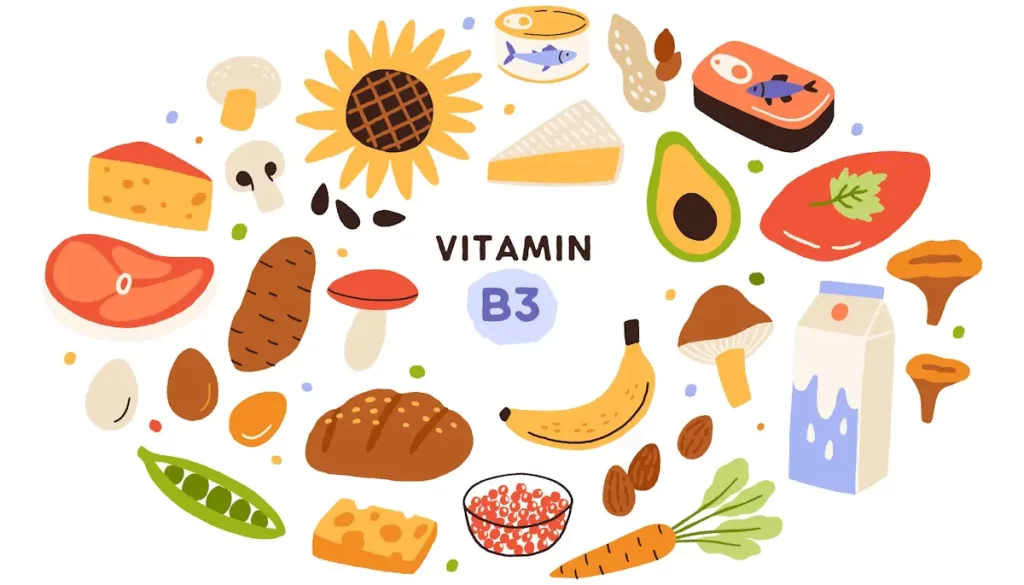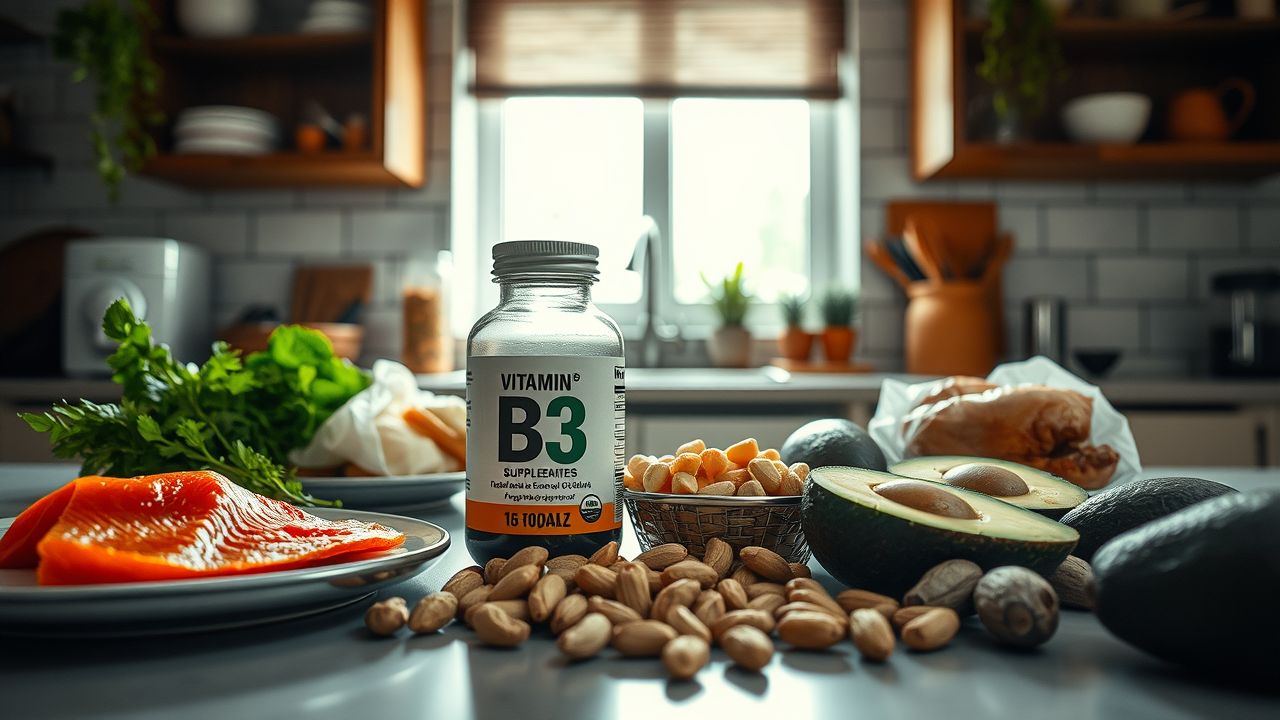Do you often feel tired or notice changes in your skin and mood? These could be signs of low vitamin B3, also called niacin. This vital nutrient powers over 400 reactions in your body, helping with energy, blood flow, and more.
Thank you for reading this post, don't forget to subscribe!In this blog, you’ll learn what niacin does, where to find it, and how it impacts your health. Keep reading—it’s simpler than you think!
Key Takeaways
- Niacin (Vitamin B3) helps convert food into energy and supports heart, skin, brain, and digestion health. It powers over 400 body reactions through coenzymes like NAD and NADP.
- Daily niacin needs vary by age and gender. Adults require 16 mg NE for men and 14 mg NE for women. Pregnant women need 18 mg daily to support fetal growth.
- Natural niacin sources include meat, fish, nuts, legumes, whole grains, mushrooms, and fortified foods like cereals. Supplements help but can cause risks if taken in high doses without guidance.
- Niacin deficiency leads to symptoms like fatigue, rash (pellagra), digestive problems, depression, or memory loss seen in at-risk groups like alcoholics or malnourished individuals.
- High doses of nicotinic acid may manage cholesterol by raising HDL while lowering LDL levels but could increase liver damage risk if misused—consult a doctor before use!
Overview of Niacin (Vitamin B3)
Niacin, also called Vitamin B3, helps your body convert food into energy. It plays a big role in keeping your skin, nerves, and digestion healthy.
Functions in the Body
Vitamin B3 helps create coenzymes like NAD and NADP. These are key in over 400 chemical reactions, giving your body energy. It keeps cells working properly and supports how you process carbohydrates, fats, and proteins for energy.
This vitamin also helps make new molecules inside your body.
It plays a big part in cholesterol regulation. It can lower bad LDL cholesterol while improving good HDL cholesterol levels. Your skin stays healthy because of it, too—it repairs DNA damaged by the sun and protects against cell damage.
Vitamin B3 also aids brain function and supports digestion for overall health balance.
Daily Recommended Intakes
The functions of niacin in the body are tied closely to how much you should consume daily. Let’s break down the recommended daily intakes of niacin, based on age and gender, in an easy-to-read table. These values are measured in niacin equivalents (NE).
| Age Group | Gender | Recommended Daily Intake (NE) |
|---|---|---|
| 0–6 months | All | 2 mg |
| 7–12 months | All | 4 mg |
| 1–3 years | All | 6 mg |
| 4–8 years | All | 8 mg |
| 9–13 years | All | 12 mg |
| 14–18 years | Males | 16 mg |
| 14–18 years | Females | 14 mg |
| 19+ years | Males | 16 mg |
| 19+ years | Females | 14 mg |
| Pregnancy | Females | 18 mg |
| Breastfeeding | Females | 17 mg |
The recommended allowance increases with age. Special circumstances, like pregnancy or breastfeeding, call for higher intakes. Values are calculated to cover the needs of most individuals without any risk of deficiency.

Health Benefits of Niacin
Niacin supports your body in many ways, keeping it strong and healthy. It helps improve heart health, brain function, and even your skin’s condition.
Improves Blood Fat Levels
High doses of nicotinic acid can lower bad LDL cholesterol and triglycerides. It also raises good HDL cholesterol, making it crucial for managing blood fat levels. For example, studies show that this form of Vitamin B3 improves lipid profiles significantly in people with high cholesterol.
Niacin supplementation might benefit those who cannot tolerate statin therapy. By improving atherogenic dyslipidemia, it may prevent cardiovascular events like heart attacks. Always consult with a doctor before using supplements at very high doses to avoid risks like liver damage or niacin toxicity.
Nicotinic acid remains one of the most effective agents for increasing HDL cholesterol.
May Reduce Blood Pressure
Niacin may help lower blood pressure, especially in people with heart disease risk factors. It relaxes blood vessels, improving circulation and reducing strain on the heart. This effect benefits those dealing with high cholesterol or other cardiovascular issues.
Large doses of niacin can also support overall heart health by improving blood fat levels. It can enhance HDL cholesterol (good cholesterol) while lowering LDL cholesterol (bad cholesterol).
Controlled trials have shown that this helps reduce risks linked to atherosclerotic cardiovascular diseases.
Boosts Brain Function
Vitamin B3 plays a key role in brain health through its help in making NAD and NADP. These coenzymes give energy to brain cells. A lack of niacin can lead to depression or memory problems.
Pellagra, from severe deficiency, harms mental clarity but improves with treatment.
Early research links niacin intake to better cognitive function. Some studies suggest it could support people with Alzheimer’s disease. Overuse, though, may harm the liver or cause other side effects.
Stick within daily recommended values for safe use and to avoid risks tied to high doses.
Enhances Skin Health
Niacin helps protect skin from sun damage. It works both inside the body and on the skin when applied in creams or lotions. A niacin deficiency can lead to pellagra, which causes a rash and other problems.
Niacin supports energy production, keeping your skin healthy and glowing.
Eating niacin-rich foods like turkey breast and brown rice boosts dermal health. Most Americans meet their daily recommended allowance (RDA) for niacin, ensuring proper care for their skin.
Up next—natural food sources of this important B vitamin!
Sources of Niacin
You can get niacin from foods, supplements, or fortified products. Keep reading to find out more!
Natural Food Sources
Niacin, a key B vitamin, is found in many natural foods. Eating these foods can help maintain healthy blood sugar levels and support overall nutrition.
- Meat like beef and pork provides good amounts of niacin. It also offers protein for muscle growth.
- Poultry such as chicken and turkey contains both niacin and tryptophan. Tryptophan helps the body make more niacin.
- Fish like tuna, salmon, and mackerel are rich in this water-soluble vitamin. They also promote heart health due to omega-3s.
- Nuts such as peanuts and almonds supply niacin along with healthy fats. These are great snacks packed with energy.
- Legumes like lentils, beans, and peas add niacin while being high in fiber for digestion support.
- Whole grains including brown rice, oats, and barley naturally contain this nutrient without fortification.
- Vegetables such as mushrooms and potatoes offer small but important amounts too.
Understanding dietary supplements follows after these food options…
Dietary Supplements
Vitamin B3 supplements help people with niacin deficiency or high cholesterol. They can lower LDL (bad cholesterol) and boost HDL (good cholesterol). Doctors also use them for some heart conditions and to improve blood fat levels.
But risks exist. Too much can cause nausea, liver damage, or a niacin flush—redness and warmth on the skin. Always follow recommended daily value guidelines. Avoid self-medicating without consulting a healthcare provider.
Fortified Foods
Fortified foods provide an extra boost of nutrients. Breakfast cereals and energy drinks often have added niacin (Vitamin B3). These foods help people meet their daily recommended intake, especially in those with limited diets.
Look for labels mentioning “fortified” or “enriched.” Products like brown rice or bread may also contain added vitamins, including other B vitamins like Vitamin B2. Fortification supports overall health by filling nutritional gaps in a simple way.

Niacin Deficiency
Lack of niacin can lead to serious health problems. Early signs might affect your skin, digestion, or energy levels—keep an eye on these changes.
Signs and Symptoms
Niacin deficiency can cause several health problems. Early signs are mild, but severe cases can lead to serious illnesses like pellagra.
- Skin becomes dry, flaky, and red. Some people may develop a rash that worsens in sunlight.
- Digestive issues like vomiting, diarrhea, or constipation may occur frequently.
- Fatigue and weakness make daily tasks feel harder than usual.
- Memory loss or confusion might happen over time as the brain struggles to function well.
- Loss of appetite can lead to unplanned weight loss or malnutrition.
- Depression or mood changes might worsen due to low serotonin levels connected to niacin shortage.
- Headaches become common and sometimes intense with prolonged deficiency.
- Severe lack can cause pellagra—a disease with symptoms like diarrhea, skin problems, and mental decline.
Untreated signs can progress into bigger health risks covered under “At-Risk Groups.”
At-Risk Groups
Some people are more likely to have a Vitamin B3 (Niacin) deficiency. These groups face higher risks due to diet, health conditions, or other factors.
- Malnourished individuals from poverty-stricken areas often lack niacin-rich foods. This issue can lead to severe deficiencies like Pellagra.
- Alcoholism increases the risk of niacin deficiency. Heavy drinking can block the body’s ability to absorb nutrients properly.
- People with anorexia may not eat enough essential vitamins, including Niacin, due to restricted diets.
- Those with Hartnup disease struggle to absorb tryptophan, which affects niacin production in the body.
- Carcinoid syndrome patients face similar issues as it diverts tryptophan into serotonin production instead of niacin synthesis.
- Women who are pregnant must ensure adequate niacin intake, as the vitamin is crucial for fetal growth and DNA repair.
- Individuals with liver or kidney diseases may have trouble maintaining proper niacin levels due to impaired organ functions.
- Low iron, riboflavin, and pyridoxine levels affect how tryptophan turns into Niacin. This raises deficiency risks in certain populations.
- Elderly individuals might need extra care since aging bodies absorb vitamins less efficiently from food sources.
- People dealing with diabetes or cardiovascular problems may already have low nutrient levels and should monitor their Niacin intake closely for overall health management.
Safety and Side Effects
Niacin is safe for most people when taken in the right amounts. But taking too much can lead to issues like flushing or liver problems… so dosage matters!
Safe Usage Guidelines
Using niacin safely is crucial. It can benefit health, but improper use may lead to side effects.
- Stick to the recommended dietary allowance (RDA). For adults, this is 16 mg niacin equivalents (NE) for men and 14 mg NE for women.
- Avoid taking high-dose supplements without medical advice. Large doses can cause a niacin flush or even liver damage.
- Consult a doctor before starting any niacin supplementation, especially if pregnant or dealing with pre-existing conditions like diabetes or heart issues.
- Monitor alcohol intake if using supplements, as alcohol increases liver risk when combined with niacin use.
- Be cautious of possible drug interactions. Statin therapy and various medications may interact with niacin—always inform your healthcare provider about all drugs you take.
- Start with low doses of supplements to reduce flushing reactions like skin redness and warmth—common but harmless effects in some users.
- Check labels for added nicotinic acid in fortified foods or vitamins to ensure total intake remains within safe levels.
- Report unusual symptoms such as nausea, jaundice, or severe itching to a physician right away—these could signal toxicity.
- Never self-treat high blood cholesterol using supplemental niacin—prescribed options are safer and more reliable.
Potential Overdose Risks
Taking too much niacin can harm your health. High doses from supplements may lead to liver damage, stomach ulcers, and muscle breakdown. Nausea, vomiting, and changes in heart rhythm are also potential risks.
Consuming alcohol while on niacin increases the chance of liver problems. Severe overdoses might cause dangerously low blood pressure or impair glucose tolerance.
Health issues like gastrointestinal distress happen more often with excessive intake. Doses over the tolerable upper intake level (UL) should only be used under a doctor’s care—niacin acts as a drug at high amounts.
Always monitor for signs such as flushing or discomfort when taking it for conditions like high cholesterol.
Interactions with Medications
Niacin may interact with medications for diabetes, blood pressure, and high cholesterol. High doses can alter how these drugs work. For example, niacin might raise blood sugar levels, making it harder to control type 2 diabetes.
Combining niacin with statin therapy could increase the risk of muscle pain or liver damage. Blood thinners like warfarin may also interact, raising concerns about excessive bleeding.
Alcohol use while taking niacin raises the chance of liver damage. Anticonvulsants used for seizures may not work as well when paired with high doses of this vitamin. Serious side effects such as fatigue and low blood pressure can happen in some cases.
Pregnant women and children should avoid exceeding recommended daily allowances unless advised by a doctor to prevent risks tied to overuse or toxicity.
Niacin in Special Populations
Pregnant women may need extra niacin to support their baby’s health. Older adults can benefit from it too, as it helps with energy and overall well-being.
During Pregnancy
The RDA for niacin during pregnancy is 18 mg NE per day. This amount supports both the mother’s health and fetal development. Niacin plays a role in DNA repair, energy production, and skin health—key functions during this time.
Low levels of vitamin B3 can harm fetal growth. In some cases, doctors may recommend niacin supplements to avoid deficiency. Prescription-strength niacin should not be used for managing cholesterol while pregnant due to risks like liver damage.
Always consult a healthcare provider before taking any supplement during pregnancy or breastfeeding.
In Elderly Individuals
As people age, their bodies may absorb and use vitamins differently. Vitamin B3 (niacin) plays a key role in supporting energy production and DNA repair—crucial for older adults.
It helps manage blood cholesterol levels, which can improve heart health over time.
Elderly individuals often face higher risks of niacin deficiency due to poor diets or certain medical conditions like Hartnup disease. Niacin supplementation might help prevent these issues but should be taken with care to avoid side effects like liver damage or niacin toxicity.
Always consult a doctor before starting supplements.

FAQs on Niacin
People often want to know how much niacin is safe and its side effects. Questions about interactions with medications are common too.
How much Niacin is too much?
High doses of niacin can be harmful. Taking over 1500 mg daily may lead to liver damage, stomach ulcers, or muscle pain. Consuming 1,000–3,000 mg a day requires medical supervision due to increased risks.
Pregnant and breastfeeding women should not exceed the recommended intake without consulting a doctor. Those with health conditions like diabetes or liver issues must also seek guidance before using supplements.
Safe niacin use depends on understanding your limits—learn more in “Can Niacin interact with other medications?
Can Niacin interact with other medications?
Too much niacin can cause problems, especially with medications. This vitamin may interact with diabetes drugs, like insulin or metformin, and raise blood sugar levels. Blood thinners such as warfarin might also pose risks when combined with niacin due to a higher chance of bleeding.
People on anticonvulsants for seizures or blood pressure medicines should be cautious too.
Some tuberculosis medications, like isoniazid, can block niacin from converting into NAD (nicotinamide adenine dinucleotide). Alcohol use increases the risk of liver damage while taking this supplement.
High doses used to treat high cholesterol may lead to severe side effects if not monitored closely by a doctor. Always inform your healthcare provider about any supplements you take along with prescription medicine.
What are the signs of Niacin deficiency?
Niacin deficiency can cause skin problems like a red, scaly rash. This often appears on areas exposed to the sun. Other signs include vomiting, diarrhea, and stomach pain. People may feel weak or tired and suffer from headaches or depression.
Severe deficiency leads to pellagra. Symptoms of this condition include memory loss, confusion, and irritability. The skin becomes thickened with dark patches that worsen over time.
Left untreated, it can lead to serious health issues or even death.
Niacin and Chronic Diseases
Niacin plays a role in managing heart health, blood sugar levels, and joint problems—learn how it may help these conditions.
Cardiovascular Disease
High doses of nicotinic acid can improve blood fat levels. It raises HDL cholesterol (good cholesterol) and lowers LDL cholesterol (bad cholesterol) and triglycerides. This may benefit heart health, but the effects are debated.
Some studies show limited success and risks like liver toxicity or increased glucose levels.
Consult a doctor before using niacin supplements for cardiovascular disease. Improper use could harm instead of help. The balance between benefits and side effects depends on individual needs and medical supervision.
Always follow safe dosage guidelines to reduce potential risks.
Diabetes Management
Niacin may help support blood sugar control. It plays a role in insulin production and glucose metabolism. Some studies suggest it can improve insulin sensitivity, though more data is needed.
This B vitamin also helps manage cholesterol levels, which benefits those with diabetes. Niacin increases HDL cholesterol (good cholesterol) and reduces LDL cholesterol (bad cholesterol).
Always check with your doctor before using niacin supplements for managing diabetes.
Osteoarthritis
Osteoarthritis affects the joints, causing pain and stiffness. It happens when cartilage breaks down over time. Low levels of niacin may play a role in worsening symptoms. Research suggests vitamin B3 could help with joint health by reducing inflammation linked to this condition.
This form of arthritis is more common as people age, but other factors like obesity or injury can increase risk too. Niacin’s role in DNA repair and reducing uric acid might make it useful for managing osteoarthritis alongside other treatments.
Conclusion
Niacin plays a big role in keeping your body healthy. It supports energy, skin health, and brain function. You can get it from foods like meat, nuts, and cereals or as supplements if needed.
But too much can harm your liver—balance is key. Talk to a doctor before adding niacin supplements to your diet for safe use!
